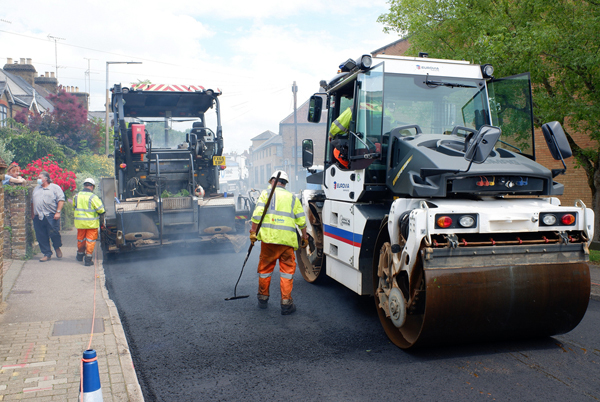Inflation and supply chain pressures have hit the roads sector with 20% cost increases since last year, senior Department for Transport (DfT) officials have been warned.
Pressures on UK supply chains have reportedly resulted in more imports from overseas adding to the sector's cost, time and carbon footprint.
Feedback from the supply chain also suggests the problems had been made worse by a lack of certainty on medium-term funding, which was described as ' a barrier to unlocking investment in skilled labour during such difficult times'.

Resurfacing being carried out by Eurovia UK, Rickmansworth, Hertfordshire, June 2021
A meeting of the UK Roads Liaison Group (UKRLG), which brings together national and local government from across the UK, was briefed this month on inflationary pressures and supply-chain delays that are affecting the industry.
It was attended by Stephen Fidler, co-director for local transport at the DfT, as well as other senior DfT officials, who sat in on specific sections of the meeting.
Representing council directors' body ADEPT, Mark Stevens shared evidence from an operations manager, who looks after supply chain and commercial relationships.
The report suggested that 'average material costs increased in excess of 20% compared to [the] same period last year'.
It also noted 'early warning notifications are predicting further cost rises in Q4 and Q1 next year'.
Delays to the actual supply of materials were also a concern in a supply chain 'that has previously worked on [a] just-in time model' resulting in 'substantially increasing non-productive time and subsequently increases prices'.
Standard stock precast concrete products were subject to increased lead-in times beyond four weeks in some cases, and specialist sustainable travel precast concrete product lead-in times were reported as still exceeding 16 weeks.
Timber stocks stabilised but haulage shortages continue to increase lead-in times beyond 8 weeks.
The UKRLG also heard that the availability of surface water plastic products is stable for small quantities but subject to increased lead-in times beyond four weeks for larger orders.
Following the Spending Review in October, Government pledged a three-year funding settlement for local authorities, albeit on a somewhat reduced budget.
The report to the UKRLG identified lack of medium term funding as 'proving a problem for the survival of Tier 2 and Tier 3 contractors'.
It stated: 'Early release of funding will provide the supply chain with the medium-term confidence that they are seeking and enable;
- early contractor involvement, coordination and communication across all supply chain tiers.
- encourage investment in apprentices, permanent recruitment and training.
- firm medium-term commitments will enable coordination with the supply chain and assist in balancing demand to reduce reliance on non-UK goods and services.
- securing the medium-term future will help to stabilise the supply chain and encourage investment in new sustainable technologies.
































